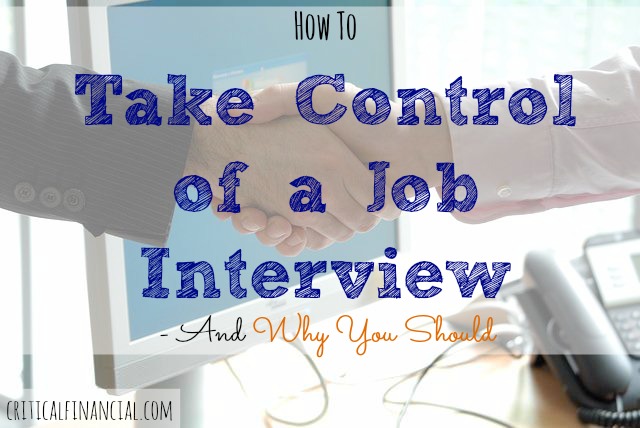 Have you been getting a lot of job interviews – but no job offers yet? Maybe you need to take control of a job interview.
Have you been getting a lot of job interviews – but no job offers yet? Maybe you need to take control of a job interview.
Most people like job interviews about as much as they like speaking before groups or going to the dentist. And if you think about it, a job interview is really a combination of both. You’re speaking before an interviewer (which can be worse than a group) – trying to convince him or her that you’re the right person for the job – while the interviewer is conducting what is essentially an examination of your candidacy.
Firing off resumes to line up interviews is fairly easy; going through the interviewing process is not. How it plays out is really a matter of how you approach it. And the best way to approach it is to be fully prepared to own the interview.
Here’s how to make that happen:
Make Sure You Can Do All That Your Resume Says You Can
Though it may be common to embellish your resume or job application to meet the requirements of the job, that strategy can blow up on you during an interview. An interview can be going very well, until you come to questions about the part of your resume that you…enhanced. At that point the truth will come out – and you’ll know it. That will make you very uncomfortable, and could represent a negative turning point in the interview.
The best way to avoid this uncomfortable and embarrassing moment is by making sure that you can in fact do whatever it is you claim that you can on your resume. A little bit of puffing up is acceptable – after all, the whole job application process is a sales job in which you are trying to sell your skills to a needy employer. But never fabricate – or substantially fabricate – skills, abilities, credentials, or experience.
If you can do what your resume says – and you can back that up in the interview – you will only impress the interviewer. If you can’t…then the interview is probably over.
Be the Interviewer – Not the Interviewee
This step is absolutely critical particularly if you’re interviewing for a job that you really want.
The mistake that many candidates make is being essentially passive in an interview, as if the interviewer is in control, and you’re just a helpless victim hoping not to be humiliated by a difficult question or series of questions. But you don’t have to let this happen.
You can avoid so much of the discomfort of interviewing by putting yourself in the position of interviewer. An interview is just that – an interview – but who actually asks the majority of the questions is really up to you. If you really want the job then you must be the one who is asking most of the questions.
Never forget that the interview is as much a mission of you determining whether or not you want to work for the employer, as it is them deciding whether or not to hire you.
Have a List of Questions Prepared in Advance
This is where we get down to the mechanics of becoming the interviewer when you’re on job interviews. You can do this simply by having a list of 10, 15, or even 20 questions that you are prepared to ask your interviewer.
Don’t imagine that you will be able to come up with these questions when you’re on the interview. This will require advanced preparation. You’ll need to have a written list of the questions that you want to ask.
Start by making a random list of questions that you want answered. Then organize them so that you have groups of questions related to one another. The questions should relate to various aspects of the job including:
- The company
- The industry
- The competition
- The company’s goals
- The department’s goals
- The major challenges facing the company/department
- Job specific responsibilities and workflows
Make sure that the wording of your questions makes it obvious that you understand the job that you’re applying for, and that you already have some knowledge of the company, the industry, and even its challenges. The questions should go to the next level, where you’re actually looking for inside information. That will make you look like a serious candidate, who has already contemplated the obvious but is looking deeper.
On the flipside, never ask questions about salary, benefits, vacations and holidays, sick time, or anything related to compensation and work conditions. These questions have no business being a part of an interview that is established to determine your candidacy for the job. Hold them until you’re given an offer.
Be Ready With Probing Questions
Within your list of questions, there should be three or four that are truly serious questions. What I mean by ‘serious’ is you should ask the type of questions that demonstrate your knowledge of the employer’s business, and making clear that you’re the right person for the job.
For example, you may let on that you know that they may be dealing with Problem X – because you experienced it with a previous employer, or know it to be a problem in the industry. You might even use it as an opportunity to make subtle suggestions as to how you might deal with it.
One more point on having a list of probing questions…at some point in the interview there could either be a period of silence, or an indication that the interviewer might be about to start asking questions you’re not comfortable answering. Having a deep question ready to throw out could be the perfect distraction. This will keep you in control of the interview, and help you to avoid embarrassing situations.
Relax and Enjoy Yourself
It may sound counterintuitive to recommend that you relax and enjoy yourself on a job interview, but that’s exactly what you need to do. The cool and collected candidate will always come across as being more attractive to an employer than one who is nervous and fidgety.
In order to help prepare yourself mentally to be able to relax in such a potentially stressful situation try some of these strategies:
- Recognize that this employer is one of many who you will be interviewing with.
- Convince yourself that you’re not even certain you want this job – that will take the pressure off.
- Acknowledge that the interview could go in the wrong direction, but that just indicates that that employer may not be worth working for.
- Realize that your life isn’t over if you don’t get this job – there’s almost certainly a better opportunity down the road.
One more thought about relaxing and enjoying the interview; not all the people who conduct interviews are necessarily good at it or even comfortable doing it. If you enter the interview in a calm, relaxed state, you’ll be doing your part to ease the pressure on the interviewer. That can turn his or her interview with you into a good interview, and may advance your candidacy for the job more than you can imagine. After all, a good interview is one of the best indications that you will be a good fit in the organization, and well worth hiring.
So there you have it – take control of the interview, and your chance of getting the job will improve immensely.
Have you ever tried this strategy?

James Hendrickson is an internet entrepreneur, blogging junky, hunter and personal finance geek. When he’s not lurking in coffee shops in Portland, Oregon, you’ll find him in the Pacific Northwest’s great outdoors. James has a masters degree in Sociology from the University of Maryland at College Park and a Bachelors degree on Sociology from Earlham College. He loves individual stocks, bonds and precious metals.

